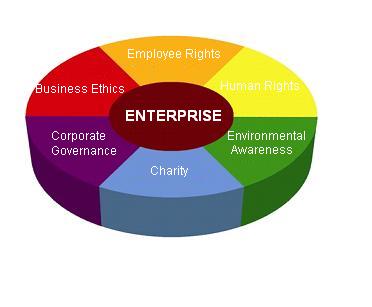Today, the social responsibility of enterprises is increasingly growing as we have issues such as financial crisis, global warning, corruption, unemployment and human rights. Today, the concept of Corporate Social Responsibility (CSR)[1] appears as a new concept that needs to be focused on.
I should say that I was first introduced to concept of CSR which covers the topic of “Our Ethical and Social Responsibilities” which is a topic I use as the last discussion topic in entrepreneurship classes every term in a more comprehensive manner by Prof. Dennis Driscoll[2] . In 2008, he gave a series of seminars in Istanbul and lectured a visiting professor at Koç University during the academic year of 2008-2009. I would like to express my gratitude to Prof. Dennis Driscoll who has many years of experience in the field of CSR for sharing his knowledge, once again demonstrating an example to social responsibility.
Most company executives to whom I asked what they thought Corporate Social Responsibility is during our discussions replied that the concept referred to school, hospital, association or foundation aids. This means that what they first thought was CSR was a form of “charity”. Although some executives also gave feedback on the other components of CSR such as “environmental awareness” and “business ethics” in addition to “charitableness” nobody was able to draw a complete picture of the concept. I will now discuss the concept of Corporate Social Responsibility briefly as it has a broad framework and can be complete and meaningful only if all its components are included in such a discussion.
What Corporate Social Responsibility (CSR) is not?
Before all else, CSR is not an advertising tool that can be limited to making donations, funding education and being environmentally conscious in order to make an appearance in the market.
Corporate Social Responsibility is in fact a set of integrated values which cover all operations of an enterprise. These can be explained using six components:
 Let us now deal with each component one by one:
Let us now deal with each component one by one:
Employee Rights:
This component can be studied under six headings:
1) Discrimination at Workplace
2) Work Hours
3) Salaries
4) Health and Safety at Workplace
5) Child Labor
6) Forced Labor
I will not be explaining each heading in detail but for the purpose of showing how wide the range is I would like give an example. If we are talking about health and safety at the workplace, we must know that it should cover all health and safety related aspects, from insuring all employees depending on their branch of business and risk level to placing “slippery ground” signs after floor polishing. Similarly, under the heading of discrimination, we should be talking about avoiding discrimination based on gender, sexual orientation, ethnic origins, nationality and the like. For example, the ratio of female senior executives at an enterprise to the total management group may throw a light on whether such enterprise discriminates based on gender.
Human Rights
This component may have many subcategories but from the perspective of human rights within the framework of the CSR of an enterprise we shall be studying the matter under three general categories.
1) Property Rights
2) Freedom of Speech
3) Health Rights
An example to acts in breach of property rights would be the unjustifiable depriving of an individual or individuals of their property rights to the benefit of an enterprise. Similarly, projects run by enterprises in a manner to jeopardize public health shall again be a violation of human rights.
Freedom of speech refers to giving employers the right to express their ideas freely within a corporate order. This is an extremely fragile issue and where enterprises do not have written procedures and establishment corporate identities that indicate what their attitude to the matter are it may be difficult to understand at first. In our company’s job interviews I often see that many of the candidates who change jobs frequently suffer from dissatisfaction caused by restricted freedom of speech.
Environmental Awareness
According to the United Nations Report, among 40 industrialized countries, Turkey, with its 95.1% carbon emission increase rate, is the country which polluted the atmosphere fastest between 1990 and 2006.[3]
There is a lot to say about the environment in our country where carbon emission per person is 4.7 tons.[4] Enterprises have serious responsibilities to provide that next generations have adequate soil, water, air and sea. It is important at this point to keep in mind that individuals have the power to impose sanctions on enterprises for environmental awareness and that they can create big differences with their demands and behavior. I recommend those who want to act consciously about this matter to read Mark Lynas’ book “Your Carbon Footprint” or visit www.karbonayakizi.com.
Charity
This component can be studied under four main headings:
1) School and university aids
2) Donations made to hospitals
3) Association and foundation aids
4) Supporting public interest oriented research and development projects
I do not feel the need to give detail explanations as the headings above as very clear. But I would like to remind you as part of my profession that in order for enterprises to record the donations they make to associations and foundations as expenses such associations or foundations should have the status of public interest associations or foundations. Furthermore, donations and aids made to General Budget Administrations, Supplementary Budget Administrations, Special Provincial Administrations, Municipalities, Villages, Museums; to film, theater, opera, ballet, classical music, Turkish classical music and plastic arts productions, activities and to institutions such as special research, training and activity centers to be founded to display activities in these fields and to international art organizations supported or deemed suitable for support by the Ministry of Culture or may be subjected to tax relief in accordance with Article 89 of Income Tax Law and Article 14 of Corporate Tax Law.
Corporate Governance[5]
This component can be studied in four main groups:
1) Transparency
2) Fair Management
3) Accountability
4) Responsibility
Transparency may roughly be defined as the beneficiaries’ right to acquire and access information. When the new Turkish Commercial Code finally enters into effect, enterprises will be obliged to publish their financial statements on their websites. Although I predict that there will be some difficulties in application, I believe that this novelty will be an important step towards transparency. The Transparency Association[6] of which I am a founder member displays various activities to promote transparency development and awareness-raising with in Turkey with the support of Transparency International[7] which is an international organization.
Fair Management refers to equal treatment to stakeholders and other beneficiaries who are entitled to the same rights. The purpose is to ensure harmonization of all stakeholders of an enterprise and prevent conflicts of interest. Fair management means that parties have equal say in all decisions about an enterprise’s operations and future.
The concept of accountability refers to the ability of the management to account at any desired time to shareholders and partners. Within this context, the management shall be liable to verify the accurateness of the decisions made and to assume responsibility for these decisions. Developing procedures to ensure smooth operation of the system and to oversee the efficiency of operations through performance criteria also remain within the scope of this concept.
The basic purpose of the principle of responsibility is to ensure that all activities of an enterprise are in conformity with laws, general practices and the rules contemplated by the company’s article of association. Components of this principle include identifying inter-unit duties, powers and responsibilities and defining the decision mechanism.
Corporate Governance Association of Turkey[8] has been displaying corporate governance activities in Turkey for a long time.
Business Ethics
Information shared by Prof. Dennis Driscoll Dennis mentions three main components of Business Ethics:
1) Product/service quality and safety
2) Avoiding misleading advertising and similar information
3) Avoiding corruption
Above-listed components deal concretely with probably the most important part of the concept of business ethics. I would like to add another component called “Other” to the concept of business ethics which I intend to explain in more detail in a separate article as ethics remains a very abstract concept despite all efforts to describe. For example, the profession of auditing is bound by a large number of standards and rules on business ethics. Although this is the case, tasks are performed by individuals and whether certain decisions or practices are ethical or not is not written in books or reports. Decisions should be made through personal judgment and sometimes one has to make these decisions alone. This is why I would like to describe this component of “Other” as “not doing unto others as you would not have others do unto you through trying to empathize with the other party”. You may think of this definition as a simple one but trying to take this into consideration when thinking at moments of hesitation about a decision will surely get you one step closer to the right decision.
Companies who consider CSR important will be taking sounder steps towards the future and added value created by them will enable them to be different in all fields. Benefits and value to be provided to all beneficiaries by such companies will be considerably higher than their competitors.
I would like to say that I believe that this concept of CSR I tried to introduce to you briefly will soon become a vital issue for enterprises. In addition to the fact that currently CSR consultancy services are offered abroad; CSR is being given as a course, companies are forming CSR units, CSR are affecting purchasers’ decisions for all goods and services offered by companies and components of CSR are now beginning to play an important role in certain strategic decisions such as company or share acquisition or sales. This surely will result in career opportunities in Turkey that should be worth using as is the case abroad.
I would like to conclude by recommending a few websites to those who are interested in the subject: www.business-humanrights.org on CSR and has separate content on Turkey and enterprises; www.bsr.com (business for social responsibility) and www.wbcsd.org (world business council for sustainable development).
——————————————————————————–
[1] CSR – Corporate Social Responsibility
[2] For further information about Prof. Dennis Driscoll is accessible through the following link: http://www.ku.edu.tr/images/corporate/sustainability/driscoll_prof_dennis.doc
[3] Karbon Ayak İziniz, Mark Lynas – Açık Radyo Kitapları p.57
[4] Karbon Ayak İziniz, Mark Lynas – Açık Radyo Kitapları p.38
[5] Corporate Governance
[6] Web address of the Transparency Association: www.seffaflik.org (under construction)
[7] www.transparency.org
[8] www.tkyd.org
Email: icoskun@mazarsdenge.com.tr
Website: www.mazarsdenge.com.tr

No Comment